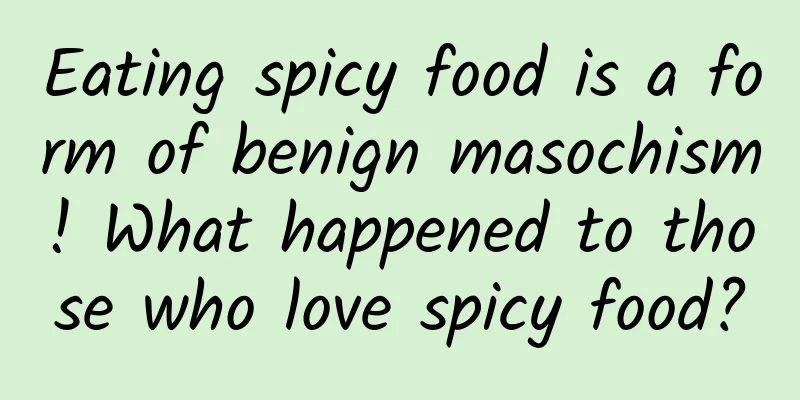Eating spicy food is a form of benign masochism! What happened to those who love spicy food?

|
Recently, there was a topic on Xiaohongshu #Eating spicy food is a form of benign masochism# which sparked heated discussion. Is there any scientific basis for this statement? If this is true, then why do many people love the feeling of eating spicy food? Is it because they are born with a "masochistic tendency"? Or are they more adventurous and adventurous? If eating spicy food is considered self-abuse, will it harm the body? Don’t be impatient, let us answer these questions one by one. Benign masochism hypothesis The excitement of “deviation” Some people say that eating spicy food is actually a form of "self-abuse". Copyright images in the gallery. Reprinting and using them may lead to copyright disputes. From a neurobiological perspective, humans do not have a special taste receptor neuron to feel "spicy" because the human response to "spicy" is essentially the response of heat receptor TRPV1 and other nociceptive receptors in neurons to capsaicin (chemical name: trans-8-methyl-N-vanillyl-nonenylamide) in chili peppers. This response includes letting the brain perceive pain and heat, which leads to a series of physiological reactions such as pore dilation, faster blood flow, blushing and sweating. So in a sense, it can be said that the "spicy taste" we are obsessed with is actually an obsession with the sensation of heat pain. In the process of evolution, thermal pain serves as a warning, and avoiding pain is the instinct of life. For example, under normal circumstances, the thermal pain caused by touching a flame will trigger a protective reflex, causing people to retract their hands in time, rather than enjoying the flame burning their fingers. But why do humans enjoy the pain brought by eating spicy food and even become more and more addicted to it? In psychology, the benign masochism hypothesis can be used to explain humans' preference for spicy food. This hypothesis holds that when we suddenly realize that a danger that originally made us very nervous does not actually exist, a deviation will occur between cognition and the body's instinctive response, and this deviation will produce a pleasant sense of excitement. It's a bit like the brain receives a "false alarm" and makes some physiological risk avoidance preparations for this "false alarm". After the "false alarm" is lifted, the negative consequences that should have occurred did not occur, so we will enjoy the stimulation of the body in a safe environment. According to the theory of benign masochism hypothesis, although eating spicy food brings pain, this pain is essentially controllable and safe. In other words, we don’t worry that eating spicy food will really hurt us, so the pain, sweating, and flushing face brought by peppers become a stimulating enjoyment. Are people who love spicy food more adventurous? There is a saying among the people that people who like or can eat spicy food have a more "hot" personality, tend to pursue new and exciting things, or have a stronger personality. So is there any basis for these sayings? Copyright images in the gallery. Reprinting and using them may lead to copyright disputes. A 2013 psychology study found that preference for spicy food may be related to the personality trait of "sensation seeking". Sensation seeking is a tendency to seek and explore novel environmental stimuli. People with this trait generally have a need to pursue change, novelty and complex stimulation. In the study, participants were asked to self-assess their favorite types of food and personality traits in a questionnaire. The results showed that those who scored higher in the "sensation seeking" item not only preferred spicy food, but also consumed foods containing capsaicin (the main ingredient of chili peppers) more frequently. In other words, they not only like the spicy feeling, but also often take the initiative to eat spicy food. At the same time, this study believes that eating spicy food frequently does not reduce the perception of spiciness, but it can make people fall in love with the burning sensation brought by eating spicy food, and this change from "pain to liking" may also be due to personality. In addition to seeking excitement, this study also found that there is a positive correlation between liking spicy food and "reward sensitivity" (Sensitivity to Reward). Reward sensitivity refers to the degree to which an individual responds to "reward" stimuli such as money, status, and social recognition. Studies have shown that people with strong reward sensitivity tend to prefer spicy food. In other words, eating spicy food may not only be a taste experience, but also a way of "self-reward" that can trigger positive emotions. For people with high reward sensitivity, the stimulating pleasure brought by eating spicy food is like a small achievement or "reward", which makes them feel satisfied and happy. In another study in 2016, the research team found that eating spicy food was positively correlated with "risk-taking tendency". Through the DSM-5 Personality Questionnaire (PID-5), the study found that the volunteers' scores on the dimension of "risk seeking" were significantly positively correlated with their spicy food behavior, but had nothing to do with their preference for spicy food. Eating spicy food hurts your mouth but not your body Spicy food is irresistible, but while satisfying their appetite, people are also worried about another problem: What about the health of people who often eat spicy food? In 2021, a large-scale cross-sectional study based on adults in Zhejiang Province found that the prevalence of hypertension was significantly lower among people who consumed spicy food more than three times a week than among those who only ate spicy food once or twice a week or did not eat spicy food. After further analysis by gender, the study found that the frequency of spicy food intake was significantly negatively correlated with systolic blood pressure in women, while no similar relationship was observed in men. Although there is currently no direct evidence to reveal the specific mechanism by which frequent spicy food consumption lowers women's blood pressure, this study suggests that spicy food may be an effective dietary intervention for preventing hypertension in women. Copyright images in the gallery. Reprinting and using them may lead to copyright disputes. In addition to preventing high blood pressure, eating spicy food may also reduce the incidence of heart disease and stroke. In 2019, the Journal of the American College of Cardiology published a study of 22,811 volunteers in Italy. According to the frequency of eating chili peppers, the researchers divided the participants into four groups: "rarely or not", "at most twice a week", "2 to 4 times a week" and "4 times a week or more". The results showed that participants who ate chili peppers at least four times a week had a 23% lower overall mortality rate, a 34%, 44% and 61% lower mortality rate from cardiovascular disease, ischemic heart disease and cerebrovascular disease, respectively, compared with those who seldom or never ate chili peppers. In addition, the mortality rate also decreased in the group that consumed a small amount of chili peppers. After reading these studies, are those who like spicy food very happy? But I would like to remind everyone that the premise is that there is no influence of oil and salt. In other words, although spicy food is good, it should be eaten with less oil and salt. For example, spicy hot pot is not recommended to be eaten often. In addition, eating too spicy food will irritate the digestive tract, so people with poor digestive function should also eat less. References [1]https://www.sciencedirect.com/science/article/abs/pii/S0195666316301660 Byrnes,NK,Hayes,JEPersonalityfactorspredictspicyfoodlikingandintake.2013 Byrnes,NK,Hayes,JEBehavioralmeasuresofrisktasking,sensationseekingandsensitivitytorewardmayreflectdifferentmotivationsforspicyfoodlikingandconsumption.2016, https://www.sciencedirect.com/science/article/abs/pii/S0303720708000178 https://link.springer.com/chapter/10.1007/978-981-16-4254-8_12 [2]https://www.sciencedirect.com/science/article/abs/pii/S0195666318309292 Wang,H.,Chen,L.,Shen,D.etal.Associationbetweenfrequencyofspicyfoodconsumptionandhypertension:across-sectionalstudyinZhejiangProvince,China.NutrMetab(Lond)18,70(2021). https://doi.org/10.1186/s12986-021-00588-7 BonaccioM,DiCastelnuovoA,CostanzoS,RuggieroE,DeCurtisA,PersichilloM,TabolacciC,FacchianoF,CerlettiC,DonatiMB,deGaetanoG,IacovielloL;Moli-saniStudyIn vestigators.ChiliPepperConsumptionandMortalityinItalianAdults.JAmCollCardiol.2019Dec24;74(25):3139-3149.doi:10.1016/j.jacc.2019.09.068.PMID:31856971. Planning and production Author: Hardy, PhD in Neurobiology, Zhejiang University Reviewer: Zhao Wei, Chief Physician of the Department of Neurology, Tianjin Teda Hospital Ruan Guangfeng, Deputy Director of the Science and Technology Food and Health Information Exchange Center |
<<: The more protein you eat, the more muscle you build?
>>: When the brain begins to shrink, these 3 signs usually appear
Recommend
Girlfriend has a headache
The main reason for my girlfriend's headache ...
Will dental neuralgia in pregnant women heal itself?
Many people suffer from tooth neuralgia in daily ...
Safe and effective methods for treating dysmenorrhea in girls
What are the safe and effective ways to treat dys...
What to do if your legs are swollen when you are six months pregnant
I believe everyone is familiar with the symptom o...
The cervical cyst disappeared after half a year
Some people do not need treatment for cervical cy...
What does rectouterine pouch fluid mean?
Regarding problems with the uterus, everyone shou...
My belly is always hard in the ninth month of pregnancy
Nine months of pregnancy is already in the late s...
Can you get pregnant if you are not ovulating?
The ovulation period is an important physiologica...
[Medical Q&A] How many types can common childhood mental disorders be roughly divided into?
Author: Zhang Cheng, Beijing Huilongguan Hospital...
What is the meridian for women?
As time goes by, people will gradually grow old, ...
What is estradiol test?
Estradiol is a C18 hormone drug and the most biol...
Benefits of breastfeeding for breast nodules
Many women have breast nodules, which is why most...
What is the cervical cyst?
Cervical cyst is a type of gynecological disease ...
How long after a miscarriage can I take a shower? Keep relevant matters in mind!
Women will be very weak after a miscarriage, so t...
Health Science | Start prevention and control of nasopharyngeal cancer as early as possible, and start popularizing knowledge from an early age!
Introduction The World Health Organization has pr...









